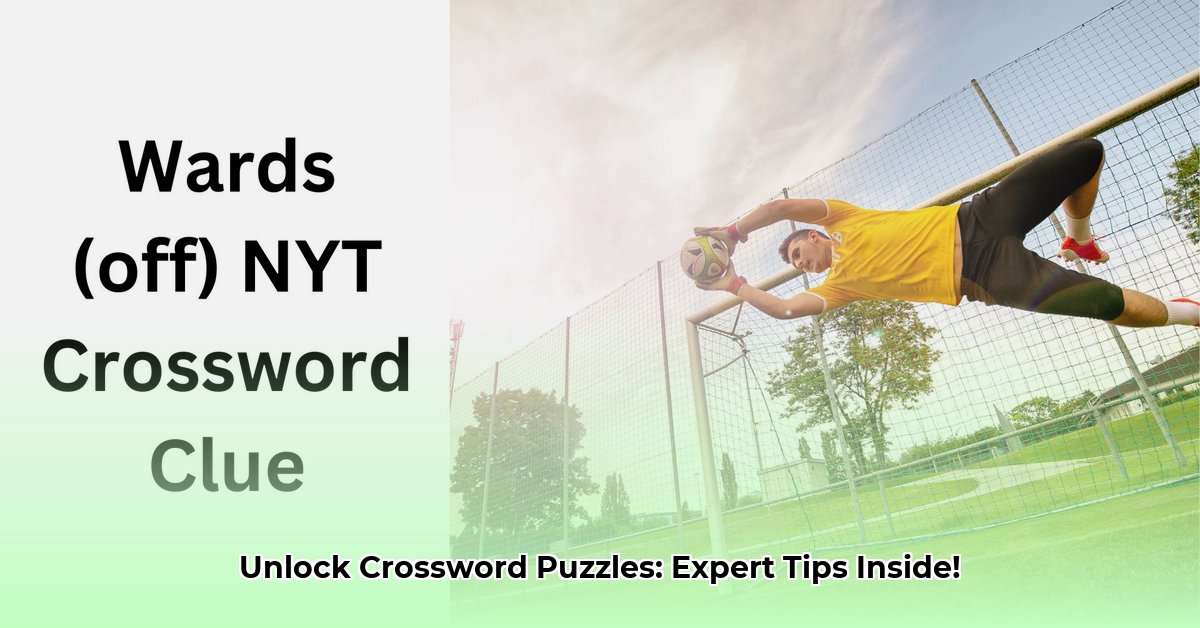Cracking crossword puzzles can be incredibly rewarding, but some clues, like “ward off,” can be surprisingly challenging. For more tips on solving tough clues, check out this helpful article on solving difficult clues. This guide provides expert strategies to effectively solve “ward off” crossword clues, exploring common and less common solutions, along with actionable problem-solving techniques to boost your skills.
Decoding “Ward Off”: Mastering the Crossword Clue
The difficulty with “ward off” arises from its multiple interpretations and potential solutions. A strategic approach is essential. Understanding these nuances will sharpen your crossword skills and turn frustration into triumph. This article equips you with techniques to understand ambiguous crossword clues.
Understanding the Clue’s Meanings
“Ward off” possesses versatile meanings. It can imply physically repelling something (like insects) or proactively preventing something undesirable (like illness). Recognizing these subtle differences and context is paramount to selecting the correct answer within the crossword grid.
Common Solutions: Familiar Answers
When presented with “ward off,” begin with common solutions frequently appearing in crossword puzzles:
- Repel: (To drive back or away) A direct answer, suggesting forceful resistance.
- Avert: (To turn away or prevent) Suggests preventing something adverse, often in a non-forceful way.
- Deter: (To discourage from acting) Indicates discouraging something from occurring, implying subtle prevention.
- Parry: (Deflect or ward off a weapon or attack) A defensive maneuver, often associated with fencing or combat.
These reliable answers provide a solid foundation for solving puzzles, especially those prioritizing accessibility.
Less Common, But Valid Solutions
Consider these less obvious solutions to unlock more complex crossword puzzles:
- Fend: (To ward off; resist) A simple, yet effective, term for defense.
- Fend off: Implies actively fighting something off.
- Forestall: Suggests proactively preventing something before it begins.
- Keep at bay: Evokes maintaining distance and control.
- Deflect: (To turn aside; to divert) Suggests redirecting something away from a point of impact.
- Stave off: (To delay something bad) Implies postponing an undesirable event.
These answers suit more demanding crosswords. They require deeper comprehension of contextual cues and a broader vocabulary.
Actionable Strategies
Implement these strategies to successfully tackle “ward off”:
- Decipher Wordplay: Identify hidden meanings and synonyms within the clue that lead to the correct answer.
- Cross-Reference Clues: Use intersecting words to gain clues and eliminate improbable answers, quickly finding the right word.
- Master Letter Count: Use the number of letters required to quickly narrow possibilities and focus on potentially valid answers.
- Eliminate Answers: Systematically rule out unsuitable answers based on crossing words or the puzzle’s theme.
Advanced Strategies
Elevate your puzzle-solving skills with advanced strategies:
- Use Online Tools Judiciously: Crossword solvers can confirm deductions but should be used sparingly to foster problem-solving skills.
- Understand Database Biases: Online crossword databases reflect common word usage, so explore unusual, valid possibilities.
Conclusion
Combine a strong vocabulary with strategic thinking to solve “ward off” clues and enhance your crossword abilities.
Pro Tip: Practice regularly by completing crosswords to sharpen your skills and become familiar with crossword vocabulary.
How to Solve Ambiguous Crossword Clues
Key strategies for solving ambiguous clues:
- Consider a wide range of possible answers.
- Shorter answers like “repel” may be more common, but longer options such as “forestall” may also be correct.
- Use surrounding thematic context to help determine the best solution.
Understanding the Nuances
“Ward off” is a tricky crossword clue because it represents a broad concept: prevention. Consider the numerous ways to avoid something bad. This ambiguity stems from the clue’s lack of specificity, increasing its difficulty.
Common Solutions
“Repel,” “avert,” and “deter” are popular and concise choices. “Repel” suggests pushing something away; “avert” implies preventing something unwanted; and “deter” focuses on discouraging something beforehand.
Less Frequent, Yet Valid, Answers
Expand your vocabulary to include answers like “fend off,” “forestall,” and “keep at bay.” “Fend off” suggests actively defending against an attack; “forestall” implies preventing something by acting in advance; and “keep at bay” indicates maintaining a safe distance.
Strategies for Success
How do you solve ambiguous clues?
- Apply synonyms and related concepts to expand answer options.
- Consider intersecting words to validate and eliminate potential solutions.
- Note the total number of letters to quickly eliminate words.
Advanced Strategies
Analyze the clue structure for unique phrasing or wordplay and use online solvers sparingly.
Advanced Techniques for Solving Difficult “Ward Off” Clues
Advanced Techniques takeaways:
- Recognize the diverse solutions reflecting multifaceted ways of prevention.
- “Repel,” “avert,” and “deter” are common answers.
- “Fend off,” “forestall,” and “keep at bay” are less common but correct.
Deciphering the Clue
“Ward off” is deceptively simple, but its multiple meanings can be tricky. What comes to mind? Probably shorter answers like “repel,” “avert,” or “deter,” right? But there’s more to this clue than meets the eye.
Common and Uncommon Answers
Crossword databases show the most frequent answers:
| Answer | Letter Count | Meaning |
|---|---|---|
| Repel | 5 | To drive or force back |
| Avert | 5 | To turn away or prevent |
| Deter | 5 | To discourage or prevent from acting |
| Guard | 5 | Protect from harm or unwanted access |
However, longer answers often fit better in specific crossword grids. Examples include “fend off,” “forestall,” or “keep at bay,” which portray a more proactive, strategic defense.
Mastering the Art of Solving
Use these strategies for solving tricky clues:
- Recognize double meanings and subtle word associations.
- Use available letters from intersecting words.
- Pay attention to letter count and patterns.
- Systematically eliminate possibilities.
Advanced Techniques
- Use solvers to identify uncommon answers.
- Analyze context for the overall theme.
- Recognize common wordplays.
- Consider historical or cultural references that might be relevant to the clue.
Test solvers’ ability to understand the subtle differences between seemingly similar words by successfully solving difficult clues.
“Ward Off” Crossword Clue Strategies for Beginners and Experts
Let’s tackle “ward off,” a chameleon clue that shifts meaning depending on the puzzle. Ready to unlock its secrets?
Understanding the Clue’s Many Faces
“Ward off” hints at prevention, avoidance, or deflection. Think about synonyms: they’re your secret weapons!
Common Solutions
Research reveals high-frequency winners:
- Repel: Top contender. Strong.
- Avert: Classic, implying prevention.
- Deter: Suggests discouragement.
- Parry: Active, like a fencer’s move.
- Avoid: To stay away from.
Less Common, Yet Valid Answers
Consider less obvious solutions:
- Fend off: Active resistance.
- Stave off: Delaying something bad.
- Forestall: Preventing by acting in advance.
- Preclude: Prevent from happening; exclude.
- Obviate: Remove (a need or difficulty).
Strategies: Mastering the Solve
- Leverage Synonyms: Expand your options.
- Cross-Referencing: Use intersecting letters.
- Letter Count is Key: Pay close attention.
- Process of Elimination: Cross out words that no longer fit.
Advanced Techniques
- Use solvers cautiously only when stuck. They assist, not replace.
- Study common crossword words to speed up solving.
- Explore the puzzle’s theme for additional clues.
- Be aware of common crossword abbreviations.
- Windows App to Stop Apps Running in Background Saves Battery - February 2, 2026
- How To Spot Android Apps Running In The Background - February 1, 2026
- Android App to Stop Background Apps and Save Battery - January 31, 2026










